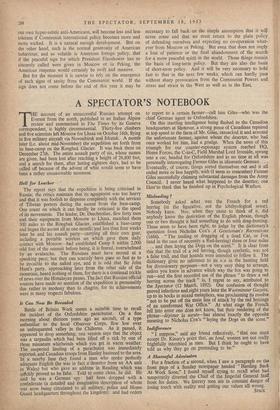Misleading ?
Somebody asked what was the French for a red herring (in the figurative, not the ichthyological sense). Nobody knew. Nor, when they came to think of it, did anybody know the derivation of the English phrase, though one or two thought it had something to do with drag-hunting. These seem to have been right, to judge by the dictionary's quotation from Nicholas Cox's A Gentleman's Recreations (1686). " The trailing or dragging of a dead Cat, or Fox (and in the case of necessity a Red-herring) three or four miles . . and then laying the Dogs on the scent." It is clear from this that the trail of a red herring, though synthetic, was not a false trail, and that hounds were intended to follow it. The dictionary gives no reference to its u.:e in the hunting field for diversionary purposes—not a very easy thing to arrange, unless you knew in advance which way the fox was going to run—and the first recorded use of the phrase " to draw a red herring across the track " is, I regret to say, attributed to the Spectator (12 March, 1892). Our confusion of thought proved infectious and eight years later the Westminster Gazette, up to its hocks in mixed metaphors, was proclaiming its resolve " not to be put off the main line of attack by the red herrings of an unreformed War Office." At what stage the French fell into error one does not know, but their rendering of the phrase—depister la meute—has almost exactly the opposite meaning to Nicholas Cox's " laying the Dogs on the scent."


































 Previous page
Previous page